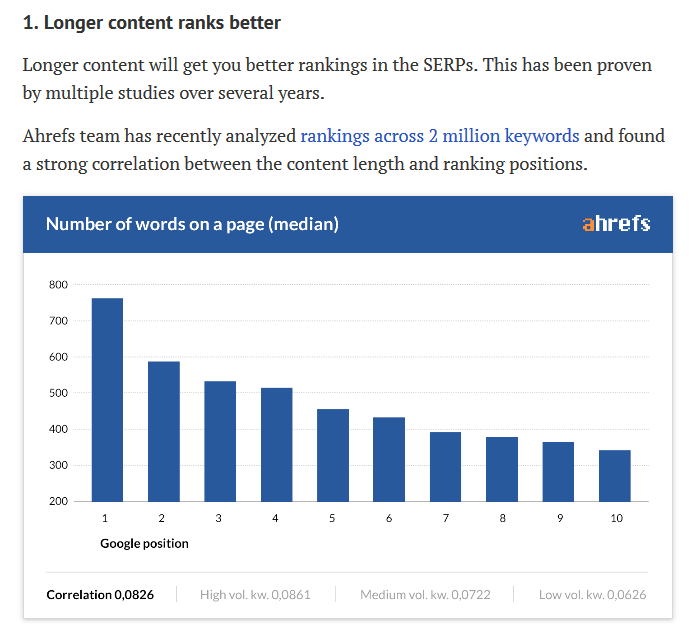Why Your Page’s Word Count Isn’t as Important as You Might Think
Here’s the formula: the longer your page’s word count is, the more chances it has to be successful in search. That’s a common belief or statement in the SEO industry. That might have been true 2 to 3 years ago, but does it still hold effective up to today – amidst all the confirmed and unconfirmed algorithm updates rolled out by Google?
Updates such as Medic, January broad core, March broad core, (announced) June broad core, etc. have targeted a variety of factors. Most of them point to authority, expertise, trustworthiness, or better known as E-A-T. Of course, the belief stems from the idea that the more words you have in your blog post, the more information it could contain. But the problem there is if the information contained is the one that the users are looking for when they input a specific search query/keyword?
Data on Long Form Content
Last 2016, Backlinko partnered with Clickstream to produce an awesome article called “We Analyzed 1 Million Google Search Results. Here’s What We Learned About SEO”. It’s a great read and I suggest you read it too since it’s a useful resource to understand how search engines (Google) rank our pages. However, one key finding that took the SEO industry by surprise is this one:

Since SEOs are adept at adjusting and adapting to sudden algorithm and foundational strategy changes, we all increased the word count of our pages to increase our chances of ranking on the first page.
Here’s the problem:
That was way back in 2016
3 years worth of algorithm changes, updates, and new factors have happened and I can’t really expect this to work as great as it did back in 2016.
If the date of the article seems to be the problem, then here’s another study done by Ahrefs back in 2018 which says the same thing.

When SEOs read studies like these, we can’t help but think that:
Longer Content = Better Rankings
But that isn’t necessarily true. I believe that longer content has higher backlink acquisition potential than shorter content and we all know how important backlinks are for SEO. To support this, Backlinko with Buzzsumo conducted another study that showed:

So it’s safe to conclude that having longer content doesn’t automatically give you better rankings. It’s about the backlink (as most of us experience) that the long form content gets. But there’s still something missing for me with regards to the problem of long form content.
Understanding User Intent and the Keywords They Use
For businesses, being visible in the search market is an important marketing tactic that enables them to improve awareness of their brand, increase lead generation and conversions. Which, for us SEOs, mean that we have to give our clients (the businesses) tangible results that benefit them. If we produce long form content for our clients that help them be more visible, but does not produce any tangible results that they’re happy with, they’ll still be still a dissatisfied client. This is where user intent, specifically, buyer keywords come into play. We have to make sure that our content (it doesn’t matter if its long form or short form) targets the right intent.
There are three buyer keywords we have to be mindful of:
- Informational Keywords – Users look for information to help them deepen their understanding of a certain product, need, service.
- Navigational Keywords – Users look for specific brands, products, services that help them satisfy their needs.
- Transactional Keywords – Users look for places to buy the specific brand, product, or service that they’re looking for.
You have to know which keywords your target audience use and structure your content in a way that it answers their questions. Your long form content will be useless if it’s just full of flowery and useless words that do not help users in any way.
With the updates that happened and the experiences we’ve had recently, I believe that satisfying or answering user intent has become an important factor for ranking well (as opposed to the past). It’s not necessarily about who puts out the longest content, but it’s about the ones that are able to satisfy the user’s search needs.
You can put out a 5,000 word article talking about anything and everything about a topic that spans multiple keywords, and you’ll see pages with shorter content that focuses on answering a keyword’s intent rank better than you.
Key Takeaway
This article isn’t to disparage the usefulness of long-form content. The purpose of this article is to realign my fellow SEO’s focus on what really matters. It’s not about longer content but it’s about being useful to the users. If you can answer a user’s query through 500 words, then don’t waste your time writing a 2000 word article. Here’s a statement by Google about word count.
Just remember that word count is not enough to make you rank well. But making an article that is backlink-worthy, that satisfies intent, and is useful for your audience is the best way to make your content rank better.
